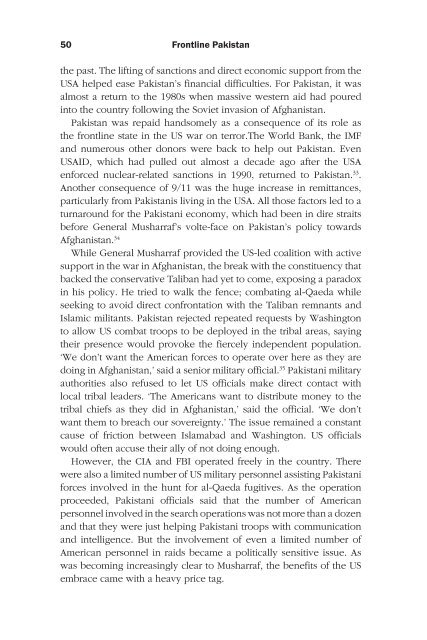Frontline Pakistan : The Struggle With Militant Islam - Arz-e-Pak
Frontline Pakistan : The Struggle With Militant Islam - Arz-e-Pak
Frontline Pakistan : The Struggle With Militant Islam - Arz-e-Pak
You also want an ePaper? Increase the reach of your titles
YUMPU automatically turns print PDFs into web optimized ePapers that Google loves.
0 <strong>Frontline</strong> <strong><strong>Pak</strong>istan</strong><br />
the past. <strong>The</strong> lifting of sanctions and direct economic support from the<br />
USA helped ease <strong><strong>Pak</strong>istan</strong>’s financial difficulties. For <strong><strong>Pak</strong>istan</strong>, it was<br />
almost a return to the 1980s when massive western aid had poured<br />
into the country following the Soviet invasion of Afghanistan.<br />
<strong><strong>Pak</strong>istan</strong> was repaid handsomely as a consequence of its role as<br />
the frontline state in the US war on terror.<strong>The</strong> World Bank, the IMF<br />
and numerous other donors were back to help out <strong><strong>Pak</strong>istan</strong>. Even<br />
USAID, which had pulled out almost a decade ago after the USA<br />
enforced nuclear-related sanctions in 1990, returned to <strong><strong>Pak</strong>istan</strong>. 33 .<br />
Another consequence of 9/11 was the huge increase in remittances,<br />
particularly from <strong><strong>Pak</strong>istan</strong>is living in the USA. All those factors led to a<br />
turnaround for the <strong><strong>Pak</strong>istan</strong>i economy, which had been in dire straits<br />
before General Musharraf’s volte-face on <strong><strong>Pak</strong>istan</strong>’s policy towards<br />
Afghanistan. 34<br />
While General Musharraf provided the US-led coalition with active<br />
support in the war in Afghanistan, the break with the constituency that<br />
backed the conservative Taliban had yet to come, exposing a paradox<br />
in his policy. He tried to walk the fence; combating al-Qaeda while<br />
seeking to avoid direct confrontation with the Taliban remnants and<br />
<strong>Islam</strong>ic militants. <strong><strong>Pak</strong>istan</strong> rejected repeated requests by Washington<br />
to allow US combat troops to be deployed in the tribal areas, saying<br />
their presence would provoke the fiercely independent population.<br />
‘We don’t want the American forces to operate over here as they are<br />
doing in Afghanistan,’ said a senior military official. 35 <strong><strong>Pak</strong>istan</strong>i military<br />
authorities also refused to let US officials make direct contact with<br />
local tribal leaders. ‘<strong>The</strong> Americans want to distribute money to the<br />
tribal chiefs as they did in Afghanistan,’ said the official. ‘We don’t<br />
want them to breach our sovereignty.’ <strong>The</strong> issue remained a constant<br />
cause of friction between <strong>Islam</strong>abad and Washington. US officials<br />
would often accuse their ally of not doing enough.<br />
However, the CIA and FBI operated freely in the country. <strong>The</strong>re<br />
were also a limited number of US military personnel assisting <strong><strong>Pak</strong>istan</strong>i<br />
forces involved in the hunt for al-Qaeda fugitives. As the operation<br />
proceeded, <strong><strong>Pak</strong>istan</strong>i officials said that the number of American<br />
personnel involved in the search operations was not more than a dozen<br />
and that they were just helping <strong><strong>Pak</strong>istan</strong>i troops with communication<br />
and intelligence. But the involvement of even a limited number of<br />
American personnel in raids became a politically sensitive issue. As<br />
was becoming increasingly clear to Musharraf, the benefits of the US<br />
embrace came with a heavy price tag.













